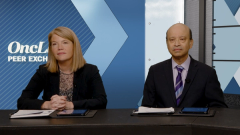
The Future of HER2+ Breast Cancer Treatment
Panelists wrap up their discussion on HER2+ breast cancer by summarizing the most exciting recent advances in the field and their hopes for the future of treatment.
Episodes in this series

Transcript:
Sara Hurvitz, MD: Thanks to all of you for this rich and informative discussion. Before we conclude I’d like to get final thoughts from each of you. We’ll start with Virginia.
Virginia G. Kaklamani, MD, DSc: This is such an exciting time. This is a field where we have so many drugs to give. I consider myself very lucky.
Sara Hurvitz, MD: I agree. Heather?
Heather McArthur, MD: I echo Virginia’s comments, and it’s so exciting to see these strategies moving into the curative-intense setting so that hopefully we can prevent metastases from occurring. I think that’s a real possibility in the near future.
Sara Hurvitz, MD: Absolutely. Melinda?
Melinda L. Telli, MD: I think it’s been a great few years with these new drugs coming on the scene for HER2-positive breast cancer. I’m really excited about the potential for de-escalation in patients with stage 2 and maybe even stage 3 disease. I’m really looking forward to trying to find the right therapy for the patient, and I think there are many patients in the curative setting with our current therapies who can [make] do with less. So [I’m] excited to see some of these data coming forward.
Sara Hurvitz, MD: Absolutely. Debu?
Debu Tripathy, MD: I think this is a testament to putting patients on clinical trials, broadening out the number of practices that are able to participate in trials, building biomarkers into our trials, and advances in the basic sciences. This is a wonderful example of that, and I think it’s going to continue.
Sara Hurvitz, MD: Beautifully said. Thank you all again. To our viewing audience, thank you. We hope you found this OncLive® Peer Exchange discussion to be useful and informative.
Transcript edited for clarity.








































